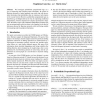Free Online Productivity Tools
i2Speak
i2Symbol
i2OCR
iTex2Img
iWeb2Print
iWeb2Shot
i2Type
iPdf2Split
iPdf2Merge
i2Bopomofo
i2Arabic
i2Style
i2Image
i2PDF
iLatex2Rtf
Sci2ools
131
click to vote
ECAI
2010
Springer
2010
Springer
Probabilistic Logic with Conditional Independence Formulae
We investigate probabilistic propositional logic as a way of expressing and reasoning about uncertainty. In contrast to Bayesian networks, a logical approach can easily cope with incomplete information like probabilities that are missing or only known to lie in some interval. However, probabilistic propositional logic as described e.g. by Halpern [9], has no way of expressing conditional independence, which is important for compact specification in many cases. We define a logic with conditional independence formulae. We give an axiomatization which we show to be complete for the kind of inferences allowed by Bayesian networks, while still being suitable for reasoning under incomplete information.
Artificial Intelligence | Bayesian Networks | Conditional Independence | ECAI 2010 | Probabilistic Propositional Logic |
Related Content
| Added | 08 Nov 2010 |
| Updated | 08 Nov 2010 |
| Type | Conference |
| Year | 2010 |
| Where | ECAI |
| Authors | Magdalena Ivanovska, Martin Giese |
Comments (0)

